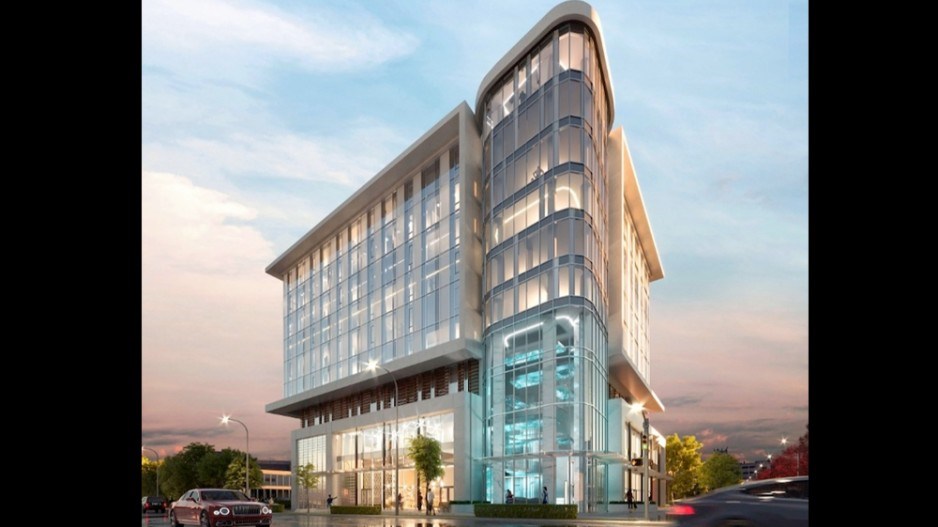Richmond wants developers to build large office spaces in its downtown, but one developer that received bonus density to do so now wants to create smaller office units in the project.
Bene (No. 3) Road Development Ltd. received 11,025 square feet of additional density for a 10-storey office and retail tower at 4700 No. 3 Road in the Aberdeen area as part of a January 2020 rezoning application. The city granted the bonus density on the condition that Bene not subdivide each floor of the planned tower into more than one strata lot.
But now Bene says market conditions require a revision to its agreement with the city.
“Due to the fact that we are facing dramatic changes in the market, we would like to emphasize that it is extremely difficult, [if] not infeasible, to market an office building under one strata title per floor,” a letter from the developer states.
It says the market is demanding smaller office units, in view of more people working from home.
Two councillors supported the developer’s proposal at the city’s April 20 planning committee meeting.
Couns. Andy Hobbs and Chak Au both spoke in favour of allowing the compromise to be approved, despite the fact it didn’t comply with a City Centre policy and city staff recommended not approving it.
Hobbs called the revised proposal a “reasonable compromise,” although he noted he’s argued in the past to stick to policy.
“But I think it’s also the role of council to make reasonable exceptions and discretionary decisions with regard to policy and that’s our role, and I think staff and council working together can achieve that,” Hobbs said about the development at No. 3 and Leslie roads, across the street from Superstore.
The original plan was to have one large office on each of the six top floors of the building. (The first four floors of the building are slated for retail use.)
A few weeks ago, the developer proposed scrapping any unit-size restrictions, but still wanted to keep the extra floor area that was granted as a bonus.
“Effectively, the applicant was requesting the ability to keep the additional density granted without having to fulfill the primary condition (i.e., creation of large floorplate leasable office space) that was secured in exchange for the increase in density,” reads the city staff report.
The planning committee didn’t approve that and last week the developer came back with a revised proposal, which would see two floors of large units and the other four floors broken up into smaller units.
One of the remaining four floors would be divided into two units. The other three floors would have offices as small as 650 square feet.
The developer also proposes giving $80,000 to the affordable housing fund.
Au said he supports the “spirit” of the large-office policy but he called the revised plan a “good compromise.” He added that no one could have predicted the changes that have happened over the past few years, ostensibly referring to the COVID-19 pandemic when many offices shut down as people worked from home.
“This kind of mix would be a good compromise in response to market changes,” Au said.
Au questioned, however, whether a proposed $80,000 contribution to the affordable housing fund was “a fair cash contribution.”
The general manager of planning, Joe Erceg, told the planning committee that Richmond shouldn’t doubt the city’s ability to attract large businesses. Most large businesses, however, are currently located in business parks outside City Centre because that’s where there are large units.
He noted the policy – to give extra density in exchange for creating large office units – was created to attract large businesses to City Centre. The report notes large offices would attract companies that are in information technology, clean tech and digital creative sectors.
“If you chop it all up before it’s built, you will not have any success attracting such businesses because you won’t have suitable premises for them,” Erceg said.
Furthermore, the most viable area for offices is City Centre, and this can be seen in its low vacancy rate of under five per cent, Erceg added.
Large offices support a “diversified economy,” city staff note in their report to city council.
Last week, the committee asked staff to provide more information on the value of the bonus before a final decision is made.
The item is back on the planning committee agenda for May 3.




